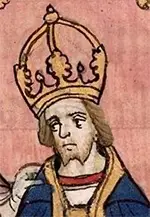Henry VII: King of Germany, Holy Roman Emperor
Henry VII was Holy Roman Emperor and King of Germany in the early 14th Century. He was the first emperor from the House of Luxembourg. 
He was born in 1273 in Valencinnes, in the County of Hainaut. His father was Henry VI of Luxembourg, and his mother was Beatrice d'Avesnes. Young Henry grew up at the court of France's Philip IV. In 1292, Henry married Margaret of Brabant. They had three children, two of whom lived into adulthood: John (1296) and Marie (1304). Henry and Margaret cemented their ties to other European nobles by marrying their daughter Marie to France's Charles IV. Their third child, Beatrix (born 1305), married Charles I of Hungary but died a year later, when she was only 14. Also, John married into the Bohemian royal family, becoming king himself in 1310. When the German king Albert I was assassinated, in 1308, Henry found himself in the middle of a political struggle because he had declared himself a vassal of the French king, who now wanted the German throne as well, for his brother, Charles of Valois. By this time, the papacy was based in Avignon, and so King Philip IV thought that Pope Clement V would support the French expansion of power. The main German contender was Rudolf, the Count Palatine. Rudolf had his enemies as well, and Henry emerged as a compromise candidate. Henry, in fact, was the choice of the electors, being named King of Germany (technically King of the Romans) on Nov. 27, 1308 and crowned at the ancestral location of Aachen on Jan. 6, 1309. Pope Clement V not only agreed with the choice of Henry as German king but also offered Henry the crown of the Holy Roman Empire (a position that had been vacant since the death of Frederick II in 1250). Henry accepted, promising to respect the sanctity and independence of the Papal States and also to go on Crusade. He was thus crowned in Rome on June 29, 1312. That coronation was the culmination of a period of asserting his overall authority, as he marched into northern Italy in 1310 at the head of a 5,000-strong army. He found an Italy bitterly divided but made his authority known, gaining the crowns of Italy and Lombardy and then of the Empire. Henry continued to throw his military and political weight around, attacking towns that held out against his authority. He was attacking the city of Siena in 1313 when he contracted malaria. He died on August 24 of that year. He was 40. |
|
Social Studies for Kids
copyright 2002–2024
David White




